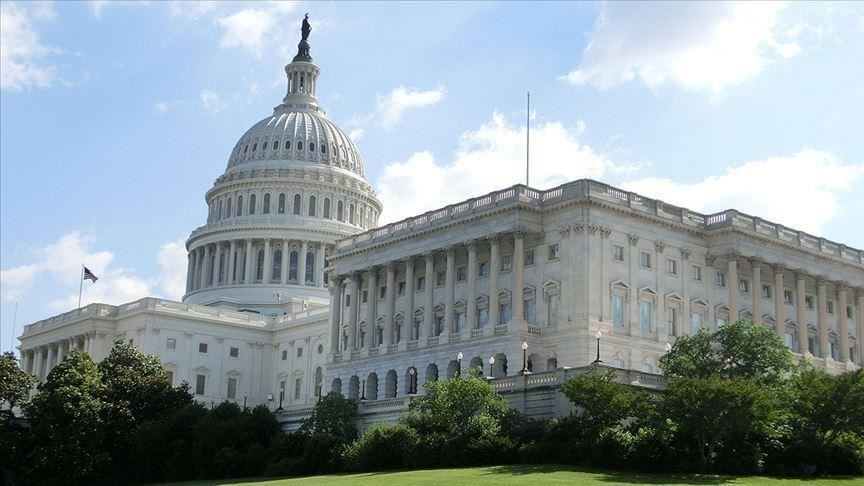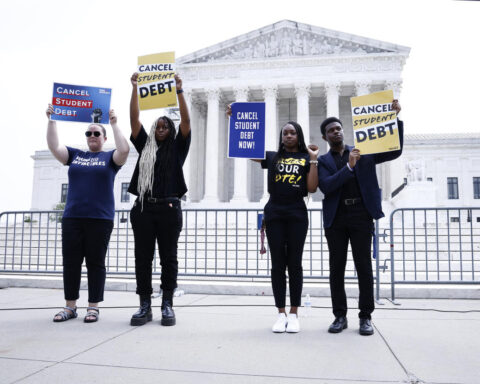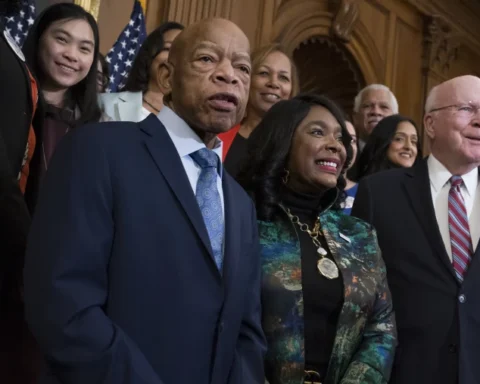The White House is under mounting pressure to get results on voting rights legislation, but sources tell CNN the Biden administration still isn’t ready to try to jam it through the Senate by force — even though the Senate’s latest voting bill is expected to falter yet again on Wednesday.
Instead of using their slim majority to force the bill through by changing the rules, the current White House plan is for President Joe Biden and Vice President Kamala Harris to step up the public-facing part of their campaign — either to gain enough Republican support or to highlight GOP inaction ahead of the midterm elections.
Progressives in the Democratic Party, however, say the White House’s approach has been woefully insufficient, expressing frustration that voting rights has been sidelined while Biden focuses on his sweeping domestic agenda.
Biden and Democratic congressional leaders have vowed this year to pass voting rights legislation that would push back against restrictive voting laws from Republican state legislatures across the country, warning the new GOP voting restrictions present an existential threat to democracy. White House officials say Biden and Harris, who sought out voting rights as part of her portfolio, have been engaged for months, pointing to a long list of meetings with advocates, calls with lawmakers and speeches on the issue.
But with basically zero Republican support for federal voting legislation, the only avenue for Congress to take action is through changing the filibuster, something moderate Democratic senators — Joe Manchin of West Virginia and Kyrsten Sinema of Arizona — say they’re unwilling to do. Manchin and Sinema are the same senators Biden needs to agree to get his social spending agenda over the finish line — and the White House has chosen to focus its lobbying of the duo on the spending package, rather than the filibuster.
“They clearly have other priorities right now, and you can’t push everybody on everything at the same time,” said a Democratic senator who supports abolishing the filibuster.
“If you believe that voting rights is the No. 1 issue, then no,” the White House hasn’t done enough, the senator said. “But I think they feel that the Build Back Better agenda is crucial to the health of our democracy.”
White House officials insist nothing has been ruled out — including lifting filibuster rules for voting rights legislation — but have stopped short of declaring Biden supportive of such a step. Privately, officials have acknowledged that a fuller conversation around the filibuster will be necessary if they hope to advance any voting rights bills in Congress.
But as Biden works to secure support from moderate Democrats for his large domestic agenda, the time for that appears to be later.
Biden’s democracy agenda
For Biden, enacting a sweeping domestic agenda with tangible benefits for millions of Americans is its own form of protecting democracy. As he’s argued multiple times over the course of his presidency, proving government can work for people is central to ensuring the future of the American political system.
Partly for that reason, much of Biden’s public attention has been focused on the infrastructure and social spending bills currently being negotiated among Democrats, and not on voting rights legislation that currently has little chance of passage without altering Senate filibuster rules. Indeed, Biden has voiced frustration that more of his time this summer was not spent on the domestic agenda, and was instead diverted to natural disasters and Afghanistan.
The future of those packages remain uncertain, but White House officials are confident provisions inside the packages will prove popular with voters once enacted.
The Senate is scheduled hold a test vote Wednesday on a new compromise voting bill that was struck with input from Manchin, who opposed a more sweeping effort that Republicans filibustered earlier this year. Manchin has tried to gain Republican support for the bill ahead of Wednesday’s vote, but he’ll surely fall short of the 10 GOP votes needed to overcome a filibuster, if he attracts any Republican support at all.
Democrats are hopeful the GOP blockade will help convince Manchin there’s no path forward on voting rights through negotiating alone.
Once the vote inevitably fails, voting rights activists warn time is running critically short for Biden and the White House to make a full-court press to convince recalcitrant Democrats to back a change to filibuster rules, or at least a carve out for voting rights. The legislation’s provisions limiting partisan gerrymandering, for instance, would be all but moot for the once-a-decade congressional redistricting if the legislation isn’t passed this year.
“We’re seeing that this President, who acts like he can’t do anything when it comes to legislation — we see the way they are leaning into infrastructure negotiations. But there’s been no similar energy put into voting rights,” said Cliff Albright, the co-founder of the Black Voters Matter Fund, who was arrested earlier this month at a voting rights protest outside the White House. “The frustration is mounting. Every passing day. Every passing week.”
Working the phones
White House officials say they understand the frustration coming from activists on voting rights, but argue that both Biden and Harris have been actively working on the issue for months. Biden and Harris have met with civil rights leaders and voting activists like Stacey Abrams. Harris has hosted numerous meetings with advocates from communities affected by the restrictive voting rights laws, and she announced a $25 million Democratic National Committee investment in voter access at a July speech at her alma mater, Howard University.
Biden himself devoted a high-profile speech at Philadelphia’s National Constitution Center to the issue in July. In that speech, Biden vowed to begin an effort “to educate voters about the changing laws, register them to vote and then get the vote out.”
But since then, he hasn’t spoken at length about the issue publicly, though officials say his engagement on the issue is likely to ramp up ahead of next year’s midterm elections. Instead, he has focused on the wide array of issues contained within his two spending bills — climate change, child and elder care, education and more — without mentioning the voting rights issue.
In his address, Biden made no mention of altering filibuster rules that would allow for voting rights legislation to pass Congress, a disappointment to activists who have pressed him to adopt a firmer stance.
Ahead of Wednesday’s vote, a White House official said Biden and Harris separately made calls to several key Democratic senators who helped draft the compromise voting bill, the Freedom to Vote Act.
When Sinema went to the White House on Tuesday and Biden spoke by phone on Monday with Manchin, however, the topic was about Biden’s spending package.
White House officials contend that steps taken by Biden’s administration outside of Congress can have significant effect, even as legislation stalls that would potentially make more of an impact. Biden signed an executive order in March that directed agencies to encourage voter registration, and the Justice Department has formed task forces to crack down on intimidation of election officials.
“If Republicans cannot come forward and stop standing in the way, if they can’t support strengthening, protecting the fundamental right to vote, then Democrats are going to have to determine an alternative path forward,” White House press secretary Jen Psaki said Tuesday.
‘This is no normal moment’
Voting rights activists charge that the White House is making a strategic error by focusing its legislative efforts on the economic package at the expense of voting rights. Social justice activist Rev. William Barber argued that the economic and voting bills should be coupled together.
“People are acting too often — it’s not just the White House — as though this is a normal political moment,” said Barber, who is co-chair of the Poor People’s Campaign. “This is no normal moment. This is one of those transformative moments in history, and you have to treat it as so. You can’t do it in the back rooms like you’ve normally done.”
Activists who’ve been meeting regularly with White House officials on voting rights say that the White House doesn’t seem to have a legislative strategy for passing the voting bill, and they’ve bristled at the notion that Democrats will “out-organize” Republican laws restricting voting and can pass economic legislation to win in 2022.
“We’re not naïve in thinking President Biden can snap his fingers and make everything change. But what comes out of your mouth is important,” said Damon Hewitt, president and executive director of Lawyers’ Committee for Civil Rights Under Law.
In a July meeting with Biden at the White House, Hewitt said he and other civil rights leaders were “very clear about the stakes, not just for him and the politics but for Black and brown voters.”
“And were also very clear that you can’t out-organize or out-campaign your way out of voter suppression because we’ve gone beyond suppression to essentially election subversion altogether,” he added.
Manchin’s compromise voting bill
On Capitol Hill, Senate Democrats made a key advancement last month on voting rights after Manchin resisted Democrats’ initial voting rights bill, which would have enacted sweeping changes to voting laws, campaign finance rules and state redistricting.
The narrower compromise measure, crafted by Manchin and Senate Democrats with input from the White House, includes an expansion of vote-by-mail and early voting and restrictions on partisan gerrymandering.
Senate Majority Leader Chuck Schumer gave Manchin time to try to find Republican backing for the measure. But those efforts have not led to any Republicans coming out in favor of the bill.
“There is nothing necessary or bipartisan about this naked power grab, so it will continue to go nowhere,” Senate Minority Leader Mitch McConnell said in a statement last week.
Without GOP support, the only avenue for the voting legislation is to change the filibuster rules. One White House official noted that while Manchin and Sinema have been most vocal about their opposition to blowing up the filibuster, a handful of other Senate Democrats have expressed a similar sentiment over concerns about Republicans pushing the rules change even further when they’re back in power.
Voting rights isn’t the only issue where Democrats have proposed doing away with the filibuster either. When Republicans refused to help Senate Democrats raise the debt ceiling earlier this month, Democrats floated a carve out in the filibuster rules for the debt ceiling, similar to what some advocates have proposed for voting rights.
With another debt limit deadline looming in December, the debate over the filibuster could return once again.
“There has to be something beyond just Mitch McConnell says no, we’re blocked,” said Texas House Democratic Caucus Chair Chris Turner, who was part of the group of state lawmakers who fled Texas to Washington May to try to prevent Republicans from passing voting restrictions. “That cannot be the end of the discussion. They got to do what it takes to get it passed.”





